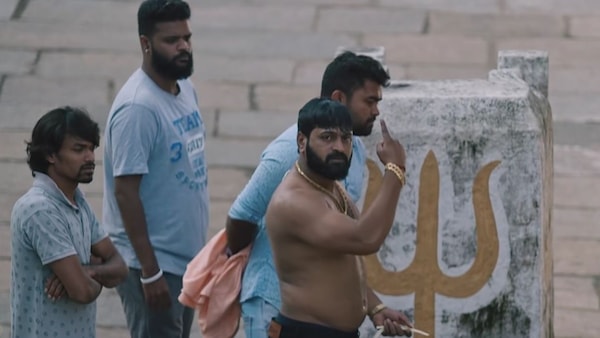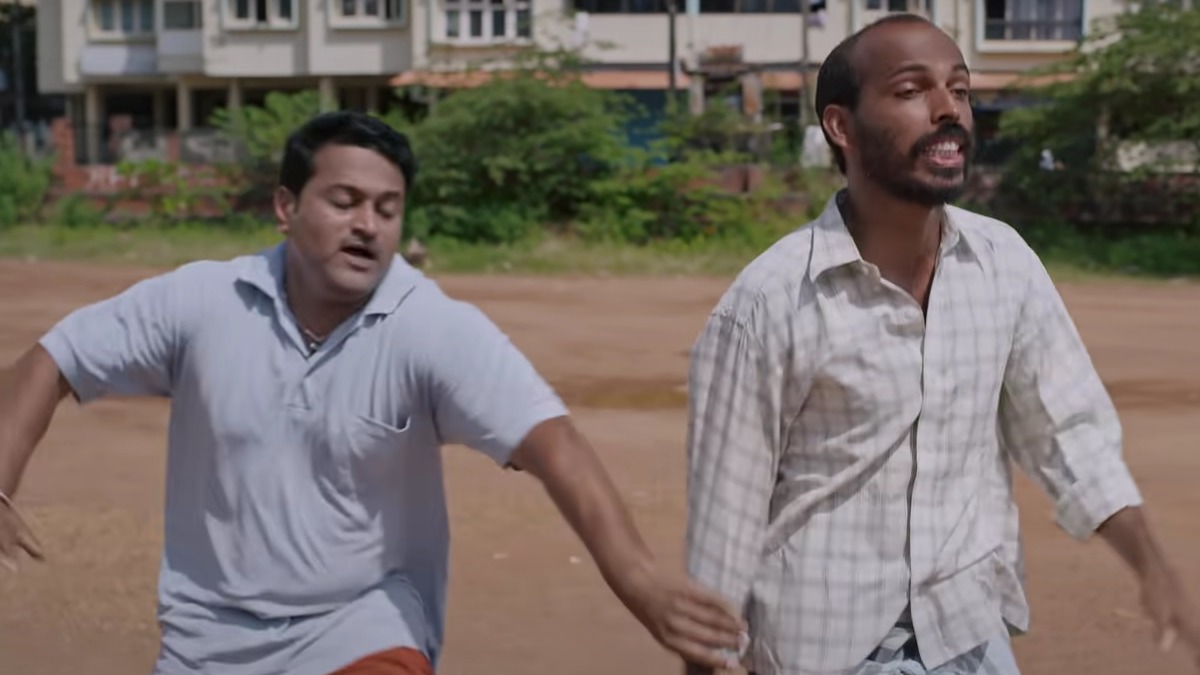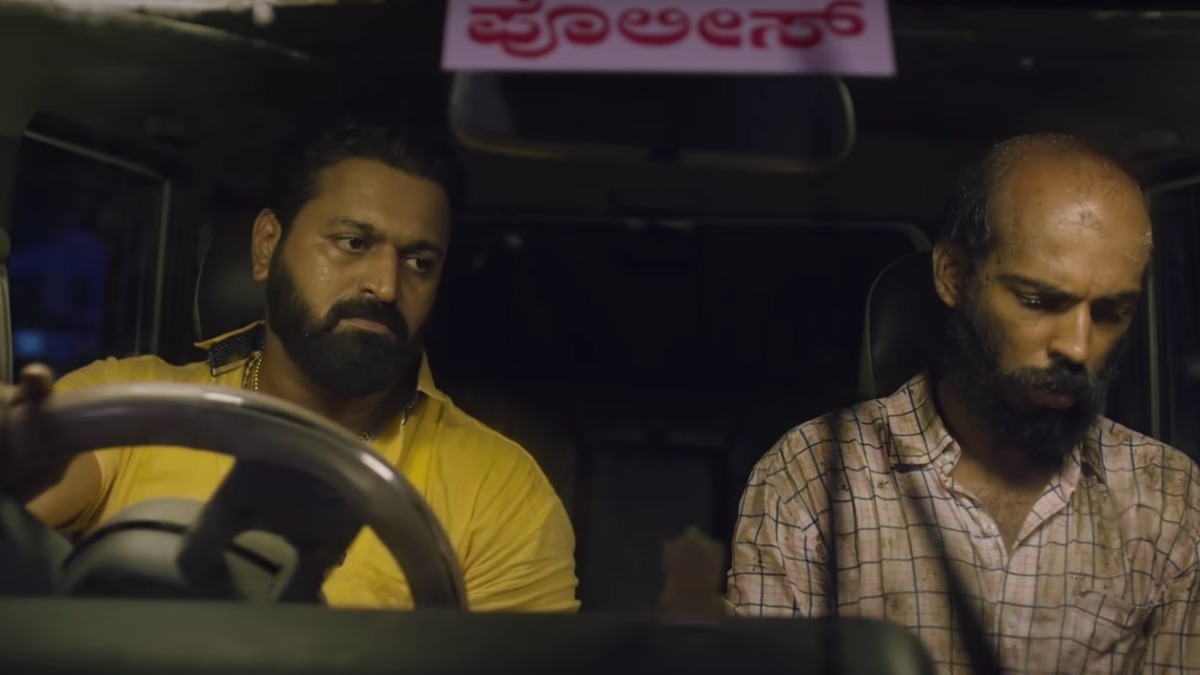Exclusive! I enjoyed making Garuda Gamana Vrishabha Vahana and Raj's clarity in filmmaking: Rishab Shetty
The film, which opens in theatres on November 19, has to be enjoyed as an experience, says Rishab.

Last Updated: 05.09 PM, Feb 10, 2022
Filmmaker-actors Raj B Shetty and Rishab Shetty have an enviable camaraderie, which stems from a mutual respect and admiration for each other as human beings and as professionals. Although they’ve collaborated professionally in minor capacities earlier, like, for instance, Raj serving on the writing team of Rishab’s directorial Sarkari Hiriya Prathamika Shaale: Kasaragodu or acting in the latter’s production Pedro, this week, they present another – directed by Raj and having the duo as protagonists – Garuda Gamana Vrishabha Vahana (GGVV). The film has grabbed eyeballs since the trailer release, the hard-hitting visuals of which were amplified by Midhun Mukundan’s haunting score.
In a quick chat with OTTplay on his return to Bengaluru after a 20-day schedule of his next directorial Kantara, Rishab spoke to us about his relationship with Raj, what drew him to GGVV, and more. Excerpts:
GGVV is a film written and directed by Raj, with him playing Shiva, while you are Hari. Keeping your personal relationship aside, how would you rate Raj as a filmmaker and actor?
I would give Raj full marks, both as a filmmaker and actor, and I don’t say that because we have just done a film together. For instance, as a filmmaker, the clarity that Raj has about how he wants to present his tale is beyond amazing. I have been a fan of Raj’s style of writing for a while, and know that he will not incorporate unnecessary elements into the narrative. Also, he insists on rehearsals for scenes, so, by the time you are ready for the actual shoot, you know your position, what you need to do, including minute details. At the most you have one or two retakes for minor corrections; that’s the level of clarity Raj has in filmmaking.
As an actor, too, he deserves 10/10 because of how involved he gets in his character. He is a complete method actor. You cannot give him something on the spot and expect him to do act. On the set, it is palpable when Raj is in character; his behaviour changes and he is no longer Raj. Shiva takes over as director and actor, which, truth be told, was not easy for the crew to handle. Audiences would have seen glimpses of that in the ‘Making of Shiva’ video that was released.
Raj has been quoted as saying that he already has an edit in mind while making the film, whereas you keep experimenting, so there’s a marked difference in working style. Was that ever an issue?
I am known to experiment with my subject right until we head to the editing table, even if I have a scene-to-scene bound script. I am all for on-the-spot improvisations if it makes sense for the film. I keep shooting multiple versions of the same scene and choose the best. Raj is not like that. I honestly believe he is the only filmmaker who works with minimal footage. Like, for instance, I am currently working on my next directorial, Kantara, for which I am looking at a minimum of 70-80 days of shoot. That’s something I follow - to shoot a lot. Raj, as you mentioned, has an edit in mind when he approaches a scene and he will shoot only what is required for that, nothing more, nothing less. He also cuts down on the number of characters to keep the footage at a manageable length.
This marked difference in our working styles as filmmakers, though, was never an issue, because on his set, it is about me being in sync with his thought process and doing exactly what is required of me. I become a director’s actor and switch off the filmmaker in me. It helps that our thought-processes are similar. When I am working with another filmmaker, I have to respect his vision for the subject, characters, etc. Of course, if there is something that doesn’t fit in well, I don’t question it, but definitely address it to make sure that the final output is what is required. That happens rarely. To a large extent, though, when I am on set only as an actor, I try not to give my interpretation to the character.

This is a film set in Mangaluru, which is home to you too, and you understand the land just as well. Did you ever think that maybe some portions of the film could have been handled differently?
Yes, Mangaluru is home, but the way Raj has showcased Mangaladevi (a temple town in the coastal city) is beautiful. There was nothing I would have wanted to change. I enjoyed every single scene of Garuda Gamana Vrishabha Vahana and how the narrative unfolds. Raj has shot this film from his perspective, if I try butting in there, it becomes my vision then and that should not happen and dilute the proceedings. Every filmmaker has an idea about why he plans certain shots, which is based on how he wants to convey a story and explores the narrative accordingly.

But were you surprised at the seriousness of the subject of GGVV when Raj narrated it to you?
Not really, because we had earlier planned another collaboration that I was to produce as well. So, I am aware of his style of story-telling. Also, just because he started off with a light-hearted comedy in Ondu Motteya Kathe, doesn’t mean that that is all he is capable of. Often, though, breaking this image and audience expectation is difficult, but it is challenge that every actor worth his salt should take up. Instead, if you keep repeating yourself in every film, you are no better than a mimicry artiste. I think GGVV will present Raj in a very different light to audiences.

What did you like most about GGVV and the characterization of Hari (his role in the film) the most?
You may have seen in the promos of the film, ‘Welcome to Mangaladevi’ and that is what appealed to me the most. This film is not about Mangaluru, but more specifically Mangaladevi and the people in that area. The characters, the way the story unfolds, the screenplay and how that affects you, as an audience, emotionally – these are the elements that stand out in GGVV and what I liked. I can confidently say that when you are done watching the film, you will be lost for words. The story and the characters will stay with you at least for a couple of days.
As for Hari, he is a man who has certain characteristics of lord Vishnu, like, for instance, his calm and composed demeanor. The fun part is that I am nothing like that in real life. In fact, I think I am more like Shiva. When I got this role, I was fresh off Bellbottom, and I had to make sure that detective Divakar is not even remotely palpable in my depiction of Hari.
What is your biggest takeaway from making this film, as an actor and as a filmmaker…
My biggest takeaway from this film is the whole experience of being a part of it. See, as an actor or filmmaker, if you don’t treat each of your projects as a learning experience, there is no point to it – you don’t grow as an artiste or as a human being. If there is no learning, then you are either doing it for fun or for money. Cinema has to be about learning and I did learn quite a bit in the making of this film. Technically, I have more experience in films than Raj, but I believe that every filmmaker is capable of teaching you something new and you must be open to that.
What else is happening?
On Monday we went into schedule break of Kantara, which is my next directorial and explores the man-nature conflict. We’ve shot for about 20 days and have 50-60 days left in Kundapura. After the release of GGVV I will head back to complete the film, since I am also acting in it. Bellbottom 2 should take off after Kantara. There are other films lined up, formal announcements for which will happen early next year. In between, we will also release my film Harikathe Alla Girikathe.
What about the film festival favourite Pedro that he has produced?
Pedro still has to do the rounds of a few more film festivals. Once done, we will apply for censor certification here and figure out a release plan.
What is the direction of your production house?
We have been making both commercial and offbeat cinema and that is not a balance that we have consciously struck for Rishab Shetty Films. The only thought behind starting a banner was to make good cinema; there’s no distinction between parallel films or commercial entertainers there. I don’t have plans to make ‘big’ films, in the sense, big-budget projects that require a massive star cast. The focus is on producing content-oriented cinema, because often, those are the subjects that languish without the right backing. I want to support subjects like that with my production house.
Garuda Gamana Vrishabha Vahana, produced by Lighter Buddha Films and presented by Paramvah Studios, opens in theatres on November 19.
Most Frequently asked questions?
Garuda Gamana Vrishabha Vahana will release in theaters on November 19

Thanks for your time & feedback, We intend to make the most it in our improvement journey
Subscribe to our newsletter for top content, delivered fast.

